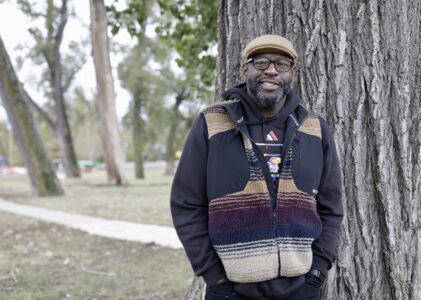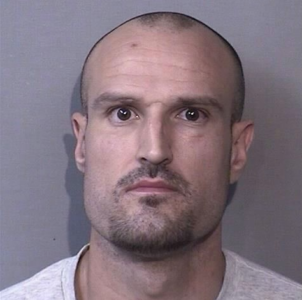At trial, student says defendant gouged his eyes in late-night attack after leaving bar

photo by: Kim Callahan/Journal-World
The Douglas County Judicial and Law Enforcement Center is pictured on Sept. 4, 2024.
A college student on Monday told a Douglas County jury that shortly after he left a bar one night last winter another young man jumped him, gouged his eyes and pulled him to the ground.
The 21-year-old student said that the man — defendant Hector Seeger, who is charged with the felony of aggravated battery — was an acquaintance from high school with whom he was not close. The reason for the alleged attack on March 7 was not clear Monday. The student described it as having come out of the blue, testifying that the pair’s interactions at the bar had been “positive.”
He said he was walking from Bullwinkle’s to his girlfriend’s apartment near KU’s football stadium. He said the defendant, another college student, left the bar too and was following closely behind around 1 a.m. The defendant also lived near the stadium, and the witness said he thought the two just happened to be walking in the same general direction after a night out. They engaged in “normal conversation,” he said — nothing memorable — when Seeger “got upset and attacked me.”
“I think he said ‘shut up!’ or something,” the witness testified, then Seeger “gouged my eyes” for 60 to 90 seconds, he estimated, and he was pulled to the ground on his back.
After some moments, the incident ended. The witness said he slowly got up and Seeger “was just gone.”
The witness could not say where exactly the incident had occurred — a point that defense attorney Hatem Chahine later seized upon to attack his credibility — but he knew it was somewhere between the bar and the HERE apartment complex where his girlfriend lived.
The gouging had impaired his vision in both eyes, so it was challenging to walk the rest of the way, but he managed to do so, he said. His girlfriend testified that she was “terrified” when she saw him because both eyes were swollen shut and emitting “bloody tears,” and he was obviously in pain. She wanted to drive him to the hospital, she said, but he refused to go. A paramedic friend of hers came over and advised that she should take him to a doctor but that he should be OK through the night, she said.
When the witness woke up, he agreed to go to an urgent care clinic, even though he had an aversion to medical facilities stemming from a lifelong medical condition known as cyclic vomiting syndrome. Clinic staff told him to go to a hospital.
His mother then drove him to the KU hospital in Kansas City, Kansas, where he said medical personnel debated whether to do surgery for a cornea abrasion but decided not to, opting instead for eye drops, ointments and painkillers.
He said that by that time he was in “some of the worst pain I’ve ever felt in my life,” and the pain lasted for weeks after. He said he could see “OK” now, but he believes the incident may have worsened his vision, such as his ability to drive at night, which Chahine attempted to dispute by noting that eyesight becomes weaker with age. The witness is 21.
The jury viewed photos taken by a forensic nurse at the hospital, by the witness’ girlfriend and by the witness himself. The photos showed various aspects of the injuries, including what appeared to be blood in and around the eyeball, swelling, reddish tears and yellow dye that medical staff had put in his eyes.
On cross-examination, Chahine questioned why the witness couldn’t say where the attack had occurred, why he waited 19 days to report it to police, why he initially reported that the attack had occurred as he was walking in the opposite direction toward his own apartment and why he couldn’t remember details about the fake ID that he was using to buy alcohol that night (he was still only 20 at the time of the incident). Chahine also questioned why he didn’t go to the doctor immediately, and, claiming that his client had injuries “all over his body,” he characterized the incident as a “fight,” prompting the witness to counter that “it wasn’t a fight, it was an attack.”
As the cross-examination became increasingly pointed, the witness asked Chahine, “Why are you raising your voice?”
The witness said he initially reported that he was going to his own apartment because he had simply misspoken, and he didn’t report the incident right away because he was focused on his eyes healing and wasn’t ready to press charges just yet. He said at one point he was concerned that “I was going to go blind.”
The state also called a mutual friend of the witness and the defendant to the stand. That man, a KU student who lived with Seeger at the time, said that he had not gone to the bars that night but had stayed home playing a video game. He said that in the early-morning hours Seeger had come home “drunk and emotional” and worried about whose “side” the mutual friend would take. He said Seeger punched his wall, then spent hours in the bathroom, as he commonly did after drinking.
The friend sent the witness a Snapchat message, displayed for the jury, which said, “Hector hella drunk and said he poked your eyes.”
The witness had testified that he himself had consumed around six drinks that night over several hours between two bars and that he felt “buzzed” but not overly intoxicated. He said that he did not intentionally inflict any injuries on Seeger beyond what might have incidentally occurred in the struggle to get away.
The state rested its case on Monday afternoon, and Chahine is expected to give his opening statement and put on his case Tuesday morning, when more evidence might be presented about issues that had been touched upon but not fully pursued. For example, prosecutor Devin Canfield had asked the witness if he had said anything racist to Seeger or talked about race with him, and the witness said no.
“Do you know his race?” Canfield said.
“I think so,” the witness said.
Attorneys also asked numerous questions about poker games that the young men played, but the relevance of those inquiries was not immediately clear Monday.
At the close of the state’s case, Chahine asked Judge Sally Pokorny for a directed verdict — that is, for the court to take the matter out of the jury’s hands and decide the case as a matter of law. Pokorny declined to do so, noting that it was a question for the jury whether Seeger’s alleged actions could have led to great bodily harm or disfigurement.






